
Sweetening “Bitter Sugar” : Jock Campbell, the Booker Reformer in British Guiana, 1934 – 1966
US$ 9.99
The publisher has enabled DRM protection, which means that you need to use the BookFusion iOS, Android or Web app to read this eBook. This eBook cannot be used outside of the BookFusion platform.
Description
Contents
Reviews
Language
English
ISBN
978-976-637-769-4
List of Illustrations
Abbreviations
Preface
Part 1: Forces That Shaped A Radical Temperament
Prologue — From Cheddi Jagan’s Bitter Sugar (1953)
1. Sugar in My Blood
2. Sugar in His Blood: Jock Campbell’s Antecedents
3. Campbell’s Boyhood: The Impact of the ‘Other’
4. Beyond the Mould: Down and Up from Oxford
Part 2: The Guyanese Sugar Plantation and the Making of a Reformer: 1934-1940
5. Demystifying the Romance of Demerara Sugar: Campbell’s Apprenticeship in British Guiana, 1934-37
6. Trouble on the Plantations, 1935: Workers Demand Change
7. Ayube Edun, The Guiana Review and the Birth of the MPCA, 1936-39: Sugar Workers Find a Voice
8. Campbell, Mild Reforms and the Beginning of the Booker ‘Cause’, 1938-40
Part 3: Getting into Stride: The Case for Reform Vindicated, 1941-1949
9. Campbell with Sydney Caine at the Colonial Office: A Model for Reform During the War
10. Governor Lethem and the Plantocracy in British Guiana, 1941-46: Another Model for Campbell
11. Race, Constitutional Change and the PAC: Edun, Lethem and the Making of Jagan’s Marxism, 1944-48
12. ‘Bitter Sugar’ and Unionism: Jagan, the MPCA and the Road to Enmore, 1944-48
13. ‘Bitter Sugar’: The Venn Commission and its Context, 1948-49
14. The Venn Commission Report, 1949: Blueprint for Campbell’s Reforms
Part 4: Revolution or Reform?: Jagan’s Marxism v. Campbell’s Reformism
15. ‘Bitter Sugar’: Unearthing the Roots of Jagan’s Marxism
16.Campbell’s Response to Jagan’s Politics: Anti-Communism, 1947-56
17. Belated Ally?: Campbell’s Modus Vivendi with Jagan, 1957-60
18. Jagan (and Burnham) in 1960: Campbell’s Confidential Assessment
Part 5: Sweetening ‘Bitter Sugar’ I: Shaping the Instruments for Reform
19. ‘Practical Idealism’: Campbell’s Philosophy on Reform
20. The Commonwealth Sugar Agreement (1951) and British Guiana: The Foundation for Campbell’s Reforms
Part 6: Sweetening ‘Bitter Sugar’ II: Modernising Booker, 1950–1951
21. Shaping the New Order: Campbell and the Modernising of Booker, 1950–51
22. Becoming an Efficient Sugar Producer: Mechanisation in Field and Factory
23. Research and Productivity on Booker Sugar Estates: The Work of Dr Harry Evans
24. Building ‘Hedges’: Facing up to the Hazards of Guyanese Politics after 1953
Part 7: Sweetening ‘Bitter Sugar’ III: Reforms on the Plantations, 1934-1964
25. Burning the ‘Bridge to the Grave’: Dr George Giglioli and the Eradication of Malaria, 1933–48
26. Health on the Plantations: Research and Preventative Medicine
27. Demolition of the ‘Pig Sties’: Housing Reform on the Plantations
28. Social Welfare on the Plantations, with Special Reference to the Community Centres and Women’s Welfare
29. Wages and Social Amenities in Field and Factory
30. ‘Guianisation’ of Sugar: Placing Guyanese at the Heart of Booker
Part 8: Jagan, Campbell and the Politics of Sugar in the Context of the Cold War, 1960-1964
31. Kennedy’s Obsession: Jagan, Castro and the Decolonisation of British Guiana, 1960–63
32. Neither Reform nor Revolution: Jagan, Campbell, the Cold War and the Sugar Industry, 1961–64
Conclusion
33. ‘On the Road to Nowhere’: Campbell’s Mission in British Guiana
Appendix I : Men Of The Moment: Sixth Generation Reformer [Jock Campbell]
Appendix II: Labour’s First Year [1964–65]: A Review Radical’s Comment on the Anniversary
Appendix III: Lord Campbell On Norman Manley (1969)
Appendix IV: Business Ethics
Appendix V : A Journey Back To My Roots: Lord Campbell Of Eskan Explains How He Would Vote If He Were Not Barred From Doing So By Being A Peer
The Sugar Plantations in Guyana Today
Coastal Villages and Plantations in Demerara and Berbice
Sugar Plantations in the Early 1950s
Bibliography
The book hasn't received reviews yet.











